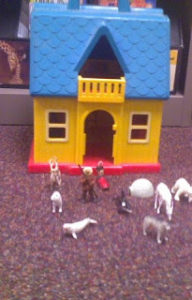Those who work in the field of child psychotherapy and psychoanalysis know the name “D.W. Winnicott” very well. Winnicott was an English pediatrician and psychoanalyst whose work with children and mothers led to the greater understanding of psychological development. A central theme in Winnicott’s work was the idea of play. Indeed, I owe the name of my blog, “The Potential Space” to him.
(For more information on Winnicott, click here )
Many parents who bring their children for therapy are puzzled with the idea of “play” in therapy and how it works. Isn’t it what their children do all day at home? Actually, not any more-especially since the invention of video games. What we see nowadays are children who are confined within the tiny screens of tablets, smart phones, DS’s and electronics in general, which restrict imagination, creativity, social interaction and exploration inside and outside. But this is a topic in itself.
Now back to play therapy and why it is different than simply “playing at home”. Here are a few important aspects of play therapy:
- It is a proven therapeutic modality. Association of Play Therapy (APT) defines it as “the systematic use of a theoretical model to establish an interpersonal process wherein trained play therapists use the therapeutic powers of play to help clients prevent or resolve psychosocial difficulties and achieve optimal growth and development.”
- It is a way of communication. Children do not have the verbal abilities to express complex emotions, thoughts and conflicts. Play therapy allows the child to “speak” to the therapist without words. Toys are used as “words” onto which the child projects feelings, conflicts, the world within their mind.
- It has a therapeutic power in itself. Children do not have much control in real-life situations. By “pretending” they have power over the world and make reality conform to their wishes. This in return, helps children feel competent and satisfied by the sense of efficacy, which especially diminishes with traumatic events.
- It is a learning experience. Play therapy conducted by a trained therapist provides children with the opportunity to process their feelings, to assess their behaviors and to develop appropriate coping skills. Through play, they explore who they are and learn how to relate to their self and others in more positive and realistic ways.
- It is a self-motivated activity. No child between the ages of 3-12 opposes to come to a safe place, where self-expression is fully encouraged by an attuned therapist, whose responses cultivate respect, empathy and freedom with a sense of responsibility.
- It is beneficial for a wide range of psychosocial problems including but not limited to: Posttraumatic Stress Disorders, Anxiety and Phobias, Disruptive Behavior Disorders, Mood Disorders, Attention Deficit/Hyperactivity Disorders, Social Skills Deficits, Grief and Loss.

